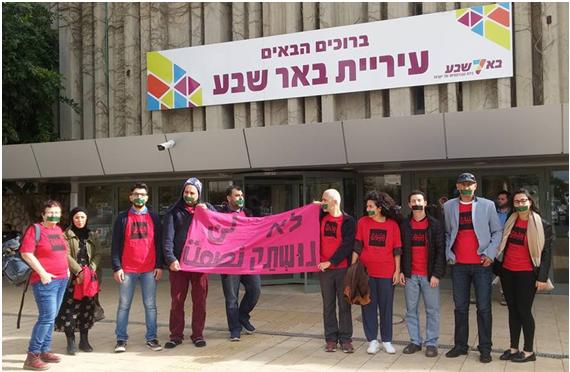The city of Be’er Sheva is attempting to evict the Negev Coexistence Forum for Civil Equality from its municipality-provided community center, “Multaka-Mifgash” (Encounter) following a concerted effort by far-right extremists. This is the only place where Jews and Arabs can meet in the southern city to work together to promote equality and understanding.

A demonstration against the eviction of the Negev Coexistence Forum from its center outside of the Be’er Sheva municipality, last week (Photo: Negev Coexistence Forum for Civil Equality
Since 1996, the Forum has been operating out of a Jewish-Arab community center, located in a renovated bomb shelter. During each of Israel’s subsequent wars, the shelter turned community center has been kept open to the public during all hours of the day. It is probably the best kept shelter in town, and more importantly, it is the only place in Be’er Sheva where Jews and Arabs can meet socially, hosting a wide range of community and cultural events — including courses in Arabic, film festivals, literary evenings, and lectures.
However, it turns out that there are those who feel that coexistence and solidarity between Jews and Arabs is subversive, even treacherous. In 2016, the Forum planned a screening of a film Trembling in Gaza, a documentary about a trauma training workshop for professional psychologists in Gaza. Shortly before the screening, the Forum received a demand from the municipality, backed by a threat of sanctions, to cancel the screening; this following alleged complaints by “neighbors” and the alleged violation of the conditions of the Forum’s contract. In short, the municipality considered the screening “political.”
Between October 2016 and April 2017, the Forum held a number of events that caused far-right extremists to take action, demanding the municipality cancel them: an evening with Yesh Gvul, a veteran group of conscientious objectors who refuse to serve in the Palestinian occupied territories. The event was held as planned. The saga continued when the Forum, together with the Association for Civil Rights in Israel (ACRI), held a workshop on photography during demonstrations, leading to accusations that it was fomenting provocation against the police.
The situation came to a head in late 2017 when the Forum hosted a lecture about the sale of Israeli arms to dictatorial regimes. In December, following hysterical accusations that the Forum was engaging in anti-Israel propaganda and besmirching the good name of the Israeli military, the municipality gave the Forum two weeks to vacate the shelter.
What is truly deeply troubling is not the fate of the Forum, nor the baseless accusations of subversion and treachery. What is a stake is freedom of speech, the freedom to criticize state institutions, to flout conventional wisdom, and challenge the consensus. The real issue is that, in Israel today, any cooperation or solidarity between Jews and Arabs is seen as deeply political and subversive. This is the real reason behind the targeting and persecution of the Forum.
ACRI has petitioned the courts to prevent the evacuation of the Negev Coexistence Forum from the municipal shelter. A spokesperson for the ACRI said: “Last week we told you about the Beer Sheva Municipality’s harassment of the Negev Coexistence Forum, and their demand that they vacate the municipal shelter in which they’ve been operating for over a decade, as the municipality and the mayor don’t like the content of the events they organize. Two years ago, the attorney general made it clear to the municipality that it is forbidden from intervening in the content of events held by associations and organizations that use its spaces, even when they do not approve of such content. It appears that the attorney general’s remarks have not convinced Beer Sheva Mayor Rubik Danilovich.”
ACRI continued: “Now we’re turning to the courts so that it will clarify to the municipality and the mayor what is supposed to be clear in advance: local authorities have a duty to allow the public to use public facilities to express varying opinions, and that these authorities are prohibited from restricting this opportunity based on the content expressed.”


